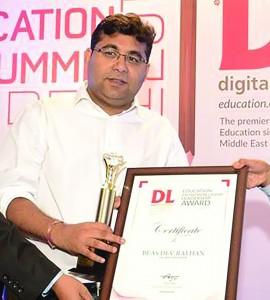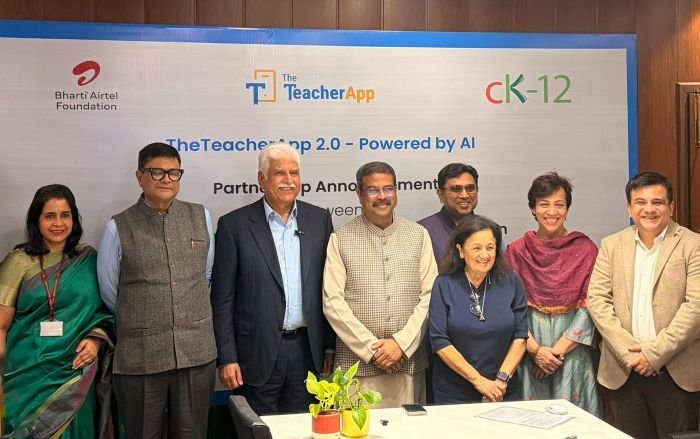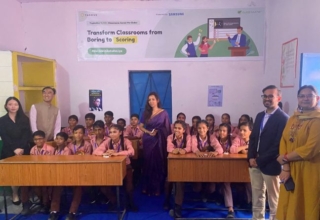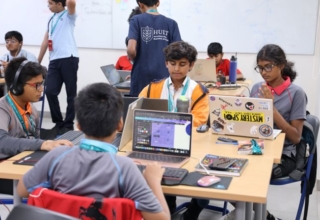
 Beas Dev Ralhan, co-founder and CEO of Hyderabad-based Next Education India Pvt Ltd (esb 2007) was recently awarded for company’s Early Childhood Education solution, Nextplay by a Noida-based publication at a conference in New Delhi. On the sidelines, in a conversation , Autar Nehru attempted to understand the success mantra of Next Education from him.
Beas Dev Ralhan, co-founder and CEO of Hyderabad-based Next Education India Pvt Ltd (esb 2007) was recently awarded for company’s Early Childhood Education solution, Nextplay by a Noida-based publication at a conference in New Delhi. On the sidelines, in a conversation , Autar Nehru attempted to understand the success mantra of Next Education from him.
If I may say so, you came from nowhere literally to become a major education company in India. How did you make this achievement possible?
I know, when we started, some people thought we are crazy when the market had half a dozen players including some MNCs around. I literally retired at the age of 28 from working abroad and objective of this venture was creating more of a social impact than big profits in a corporate sense. Even a marginal profit of 15% is good enough as long as we stay on course. As a company we remain focused on providing value to our customers be it students, teachers or schools. Our declared (on company website) offering is optimized solutions not great or best solutions. And it has paid off; major portion of our revenue today is from renewals. We are present all over the country even in places like Ladakh, Arunachal Pradesh and Imphal in about 10,000 schools because of this focus.
That sounds incredible?
Our whole focus is on making the system run. We work on an integrated approach where our client not only sees value but feels assured that we’ll deliver. Upfront we create the digital classroom experience, provide service backup assurance for five years and integrate software and content mapped to the prescribed curricula. We keep things simple and you’ll be surprised that all our content is around 50 GB only.
Your penetration or let’s call it presence in every state in itself is a feat. Was it easy?
Oh no. It wasn’t easy at all. We encountered problems, but we didn’t shy away from solving those problems. That is a big reason we have grown over the years. I’ll give you an example of stabilizers. We imported stabilizers from Taiwan which could withstand fluctuation from say 40 volt to maximum 250 volts. But, in some of our places, the voltage sometimes shoots over 300 volts thanks to some indigenous jugaads to fight voltage issues. And in the process, lots of our stabilizers tripped and got damaged. My colleague (Raveendranath) Kamath (co-founder and CFO) who is a B Tech in Instrumentation Engineering from IIT Kharagpur is very passionate about instruments and he worked hard on this problem and made stabilizers work. Likewise, we designed and developed a ‘remote’ to operate computers. We are not deterred by problems and find a solution.
That brings focus on your team size and service backup system. Give us a sense of how it is done?
Well 600-700 people alone work on content. And equally a strong service/technical team stationed at various locations. The response from our side has been proactive and that’s how we won trust of so many schools.
Will you remain confined to K-12 segment or have plans to foray in other segments like higher education, etc?
No we’ll remain focused on K-12 rather. As I said, our whole focus is on prescribed curriculum by various boards, so we have solutions for various state boards, in almost 11 languages besides central boards like CBSE and ICSCE. We are confined to text books and won’t even go for things like test prep or competitions. We will cater to pre-school to class VIII exhaustively and syllabus specific to secondary and senior secondary classes.
You also published text books this year?
Yes. We generated $ 10 million business from books from first year itself. Here again we provided books mapped to curriculum and as per needs felt by stake holders till class X. And this has been a good decision and in tune with our business philosophy.
What are your ambitions for the company?
By 2020, about 25% of children in India must be using Next Education solutions and books. Then only would we make some big social impact that we promised ourselves while setting off on this journey. And given the way we have progressed particularly in the last three years, I am very hopeful about achieving this goal mission.
You have developed a kind of 360 degree approach, where do teachers fit in?
Oh we conducted over 250 teacher-principal conferences last year and will cross this number this year. I must tell you that these conferences are not about products or promotion. These are pure teacher-technology issue centred. Our experts and other speakers provide useful insights, updates and share first hand experiences about education technology and teaching issues. We understand teacher and don’t want to add to his or her workload. We want to make their work easy.
Do you feel digital India initiative will genuinely help education in this country?
It is a great initiative. This will make people adapt to technology and once they accept technology, it will be a transformation. It will change set perceptions. And then education services delivery can become widely acceptable. Another aspect could be if government digital platforms are able to store big data on education, it might help in understanding what works and what not. So accordingly interventions at micro level could be made successfully.
You have been engaged with school education for some years now in India, can you identify a few key challenges that India faces today in this field?
One is we Indians are mostly terrible parents. We don’t feel responsible towards education of our children beyond paying his school fees, coaching and may be his hobbies. No society has benefited where parent don’t engage education of children. That has to change.
Second is the government has to figure out how to run its schools. There are some progressive examples like that of Rajasthan which is paying RTE money on time. The mindset has to be open for possibilities.
And third I must say country needs connectivity at least equivalent to a bandwidth which can support YouTube access. Addressing these challenges will be a great service for education of our children.









